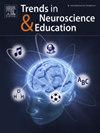Previous neuroscience exposure predicts self-efficacy among undergraduate students
IF 3.4
Q2 NEUROSCIENCES
引用次数: 0
Abstract
Background
Academic self-efficacy refers to undergraduates' beliefs in their abilities to execute the necessary actions to meet academic goals. Studies suggest that academic self-efficacy is essential to undergraduates’ development, affecting their integration, motivation, and academic success. Research also indicates that understanding general neuroscience concepts can shape the motivation to overcome challenges and succeed in the educational setting. However, the relationship between self-efficacy in higher education and exposure to neuroscience is still under-researched in the scientific literature. This study aims to examine prior exposure to neuroscience and identify predictors of self-efficacy among undergraduate students.
Methods
Data from 303 undergraduates were collected through online surveys, covering information on sociodemographics and prior exposure to neuroscience (i.e., no exposure, extracurricular neuroscience courses, neuroscience-related classes, and both). Additionally, a general neuroscience knowledge questionnaire was conducted to ascertain students' familiarity with the subject, and the Higher Education Self-Efficacy Scale (HESE) was used to measure perceptions of self-efficacy within the context of higher education. Descriptive and inferential analyses (t-test and one-way ANOVA) compared general neuroscience knowledge and HESE scores between groups, while linear regression identified HESE predictors.
Results
Performance on the general neuroscience knowledge questionnaire was consistent across gender, institution type, and field of study, but there was a significant difference among the levels of exposure to neuroscience (F(3,299) = 8.45, p < 0.001, η² = 0.08). Self-efficacy was higher in private institution students (t(301) = 4.07, p < 0.001, d = 0.66) and those with more neuroscience exposure (i.e., both neuroscience-related classes and extracurricular neuroscience courses) (F(3,299) = 3.73, p = 0.01, η² = 0.04). Regression models indicated institution type (i.e., private) and neuroscience exposure (i.e., neuroscience-related classes, and both neuroscience-related classes and extracurricular neuroscience courses) as significant self-efficacy predictors (adjusted R² = 0.07, F(5,297) = 5.21, p < 0.001).
Conclusions
The results present novel findings for the field of neuroeducation, highlighting the significant relationship between previous exposure to neuroscience and increased self-efficacy in undergraduate students. The study emphasizes the need for neuroeducation programs for undergraduates, equipping them with tools to support their academic success and personal well-being.
先前的神经科学接触可以预测大学生的自我效能感
学业自我效能感是指大学生对自己为实现学业目标而采取必要行动的能力的信念。研究表明,学业自我效能感对大学生的发展至关重要,影响着大学生的整合、学习动机和学业成功。研究还表明,理解一般的神经科学概念可以塑造克服挑战并在教育环境中取得成功的动机。然而,在科学文献中,高等教育中自我效能感与接触神经科学之间的关系仍未得到充分研究。本研究旨在探讨神经科学背景下大学生自我效能感的影响因素。方法通过网络调查收集303名大学生的社会人口学信息和神经科学相关知识(未接触、课外神经科学课程、神经科学相关课程以及两者)。此外,通过神经科学常识问卷调查了解学生对学科的熟悉程度,并使用高等教育自我效能感量表(HESE)测量学生在高等教育背景下的自我效能感。描述性和推断性分析(t检验和单因素方差分析)比较了两组之间的一般神经科学知识和HESE分数,而线性回归确定了HESE的预测因子。结果不同性别、机构类型和学习领域的大学生在神经科学常识问卷上的得分基本一致,但神经科学接触水平之间存在显著差异(F(3,299) = 8.45, p <;0.001, η²= 0.08)。私立院校学生自我效能感较高(t(301) = 4.07, p <;0.001, d = 0.66)和接触过更多神经科学课程(即神经科学相关课程和课外神经科学课程)的学生(F(3,299) = 3.73, p = 0.01, η²= 0.04)。回归模型显示机构类型(即私立)和神经科学接触(即神经科学相关课程,以及神经科学相关课程和课外神经科学课程)是显著的自我效能预测因子(调整后R²= 0.07,F(5297) = 5.21, p <;0.001)。结论本研究结果为神经教育领域提供了新的发现,强调了先前接触神经科学与大学生自我效能感的显著关系。该研究强调了本科生神经教育项目的必要性,为他们提供工具,以支持他们的学业成功和个人幸福。
本文章由计算机程序翻译,如有差异,请以英文原文为准。
求助全文
约1分钟内获得全文
求助全文
来源期刊

Trends in Neuroscience and Education
NEUROSCIENCES-
CiteScore
6.30
自引率
6.10%
发文量
22
审稿时长
65 days
 求助内容:
求助内容: 应助结果提醒方式:
应助结果提醒方式:


